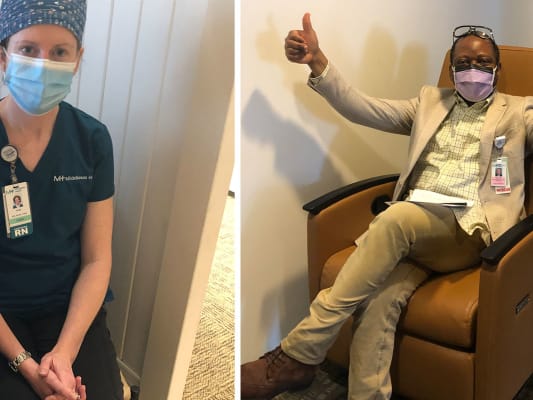COVID-19 Vaccines: What You Need to Know

Knowledge is power, and as you contemplate whether to get vaccinated when you are given the opportunity, Middlesex Health wants to ensure that you have as much information as possible so that you can make an informed decision.
About the vaccines
The U.S. Food & Drug Administration has granted emergency use authorization for two COVID-19 vaccines. One is made by Pfizer and BioNTech; the other by Moderna. Both are mRNA vaccines given as shots, and they do not contain the actual virus, which means you cannot get COVID-19 from either vaccine. They also do not use any fetal cell cultures to produce the vaccine.
The vaccine works by making your cells produce a part of the COVID-19 virus attachment (spike protein), and your immune system then creates antibodies. The mRNA doesn’t change your genes in any way, and it disintegrates within hours of getting into the cells.
These vaccines were able to be created in a short amount of time because of upfront financing, regulatory support and existing technology. Both vaccines are highly effective in preventing COVID-19 and have been shown to be safe and well tolerated during clinical trials. For full protection, you must get two doses (two shots).
One notable difference between the two vaccines is in the time between doses. The Pfizer-BioNTech vaccine is given 21 days apart, and doses of Moderna are given 28 days apart.
Millions of healthcare and essential workers have already received a COVID-19 vaccine. The most common side effects observed were pain at the site of injection, fatigue, headache, muscle pain, chills or fever. The chance for these reactions is higher with the second dose than with the first dose. Most of these reactions resolve within 24 to 48 hours after vaccination.
How can you get vaccinated?
Middlesex Health is following state of Connecticut guidelines and currently providing vaccines to frontline health care workers, medical first responders and those 75 and older. Only individuals who are eligible can currently schedule appointments through MyChart or the Vaccine Administration Management System.
To find essential information about available appointments, your eligibility, how to schedule a vaccine appointment, the process of getting the vaccine, the location of the Middlesex Health Vaccine Clinic and many other frequently asked questions, please visit MiddlesexHealth.org/Vaccine.
The easiest way to schedule a vaccine appointment with Middlesex Health will be through your MyChart patient portal. If you don’t already have a MyChart account, be sure to sign up for one today.
Please note that Middlesex Health is given a certain number of vaccines each week by the state and federal government and is not able to control this quantity. If you do not see any appointments for Middlesex Heath in the Vaccine Administration Management System or in MyChart, it means that all available appointments for the week are filled, and you are encouraged to check back. Each Monday, Middlesex will open up new vaccine appointment slots for the upcoming week, based on the number of vaccine doses available. Your patience and understanding is appreciated.
What happens after you get vaccinated?
If you get vaccinated, you should continue to wear your face mask, maintain your social distance and practice good hand hygiene. While vaccines are highly effective, it is still possible to get COVID-19 after you receive your vaccine. The vaccine may prevent you from getting severely sick. Until a larger percentage of the population receives the vaccine, COVID-19 can still spread.
At this time, how long the vaccine will keep you safe from COVID-19 is unknown. As more data is gathered, more information about how long protection lasts will be learned.
For more information
For more information about the COVID-19 vaccines, click here.
For more information about the coronavirus, testing and its impact on Middlesex Health, click here.
More Stories
Healing One Tune at a Time
Middlesex Health Cancer Center offers free virtual music therapy sessions to individuals with cancer. Music therapy is the use of music or elements of music to help manage a range of conditions and improve your quality of life.
Spotlight: Men’s Health
When it comes to health care concerns that disproportionately impact men, such as heart disease and cancer, there is good news despite the grim statistics. With the help of a health care provider, many diseases are preventable.